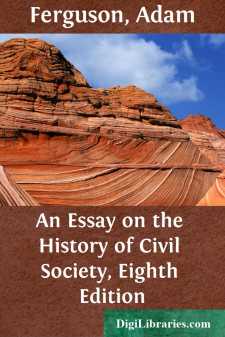Categories
- Antiques & Collectibles 13
- Architecture 36
- Art 48
- Bibles 22
- Biography & Autobiography 813
- Body, Mind & Spirit 142
- Business & Economics 28
- Children's Books 15
- Children's Fiction 12
- Computers 4
- Cooking 94
- Crafts & Hobbies 4
- Drama 346
- Education 46
- Family & Relationships 57
- Fiction 11829
- Games 19
- Gardening 17
- Health & Fitness 34
- History 1377
- House & Home 1
- Humor 147
- Juvenile Fiction 1873
- Juvenile Nonfiction 202
- Language Arts & Disciplines 88
- Law 16
- Literary Collections 686
- Literary Criticism 179
- Mathematics 13
- Medical 41
- Music 40
- Nature 179
- Non-Classifiable 1768
- Performing Arts 7
- Periodicals 1453
- Philosophy 64
- Photography 2
- Poetry 896
- Political Science 203
- Psychology 42
- Reference 154
- Religion 513
- Science 126
- Self-Help 84
- Social Science 81
- Sports & Recreation 34
- Study Aids 3
- Technology & Engineering 59
- Transportation 23
- Travel 463
- True Crime 29
An Essay on the History of Civil Society, Eighth Edition
by: Adam Ferguson
Description:
Excerpt
SECTION I.
OF THE QUESTION RELATING TO THE STATE OF NATURE.
Natural productions are generally formed by degrees. Vegetables are raised from a tender shoot, and animals from an infant state. The latter, being active, extend together their operations and their powers, and have a progress in what they perform, as well as in the faculties they acquire. This progress in the case of man is continued to a greater extent than in that of any other animal. Not only the individual advances from infancy to manhood, but the species itself from rudeness to civilization. Hence the supposed departure of mankind from the state of their nature; hence our conjectures and different opinions of what man must have been in the first age of his being. The poet, the historian, and the moralist frequently allude to this ancient time; and under the emblems of gold, or of iron, represent a condition, and a manner of life, from which mankind have either degenerated, or on which they have greatly improved. On either supposition, the first state of our nature must have borne no resemblance to what men have exhibited in any subsequent period; historical monuments, even of the earliest date, are to be considered as novelties; and the most common establishments of human society are to be classed among the encroachments which fraud, oppression, or a busy invention, have made upon the reign of nature, by which the chief of our grievances or blessings were equally withheld.
Among the writers who have attempted to distinguish, in the human character, its original qualities, and to point out the limits between nature and art, some have represented mankind in their first condition, as possessed of mere animal sensibility, without any exercise of the faculties that render them superior to the brutes, without any political union, without any means of explaining their sentiments, and even without possessing any of the apprehensions and passions which the voice and the gesture are so well fitted to express. Others have made the state of nature to consist in perpetual wars kindled by competition for dominion and interest, where every individual had a separate quarrel with his kind, and where the presence of a fellow creature was the signal of battle.
The desire of laying the foundation of a favourite system, or a fond expectation, perhaps, that we may be able to penetrate the secrets of nature, to the very source of existence, have, on this subject, led to many fruitless inquiries, and given rise to many wild suppositions. Among the various qualities which mankind possess, we select one or a few particulars on which to establish a theory, and in framing our account of what man was in some imaginary state of nature, we overlook what he has always appeared within the reach of our own observation, and in the records of history.
In every other instance, however, the natural historian thinks himself obliged to collect facts, not to offer conjectures. When he treats of any particular species of animals, he supposes that their present dispositions and instincts are the same which they originally had, and that their present manner of life is a continuance of their first destination....


